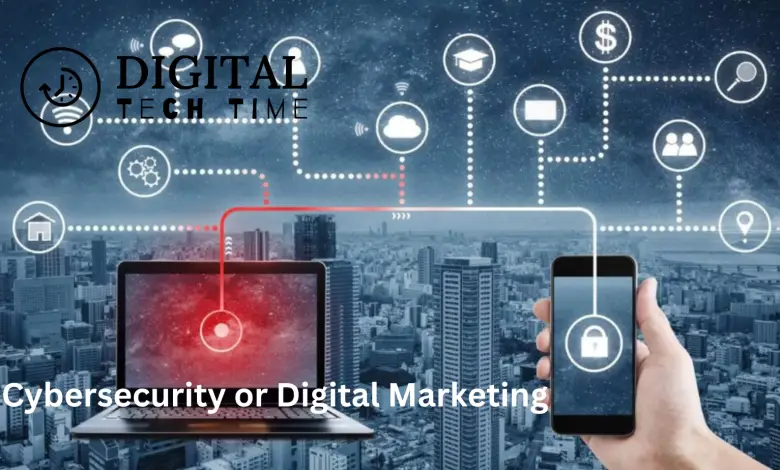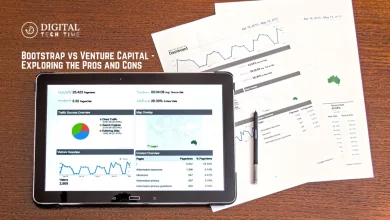Cybersecurity or Digital Marketing: Choosing the Right Career Path

Cybersecurity and digital marketing are two of the most in-demand fields in today’s job market. Both offer exciting opportunities for growth and advancement, but which one should you choose? The answer depends on your interests, skills, and career goals.
Cybersecurity is the practice of protecting computer systems and networks from digital attacks, theft, and damage. The field is rapidly growing, with a projected 32% increase in job opportunities by 2028. Cybersecurity professionals are highly sought after, with many positions offering competitive salaries and benefits. However, the field can be challenging, requiring a strong technical background and a willingness to stay up-to-date with the latest threats and technologies.
Digital marketing, on the other hand, is the practice of promoting products or services through digital channels such as social media, email, and search engines. The field is also growing, with a projected 8% increase in job opportunities by 2028. Digital marketing professionals are creative, strategic, and tech-savvy, with many positions offering a flexible work environment and opportunities for remote work. However, the field can be competitive, requiring strong communication skills and a willingness to adapt to new trends and technologies.
Key Takeaways
- Cybersecurity and digital marketing are both growing fields with high demand for professionals.
- Cybersecurity requires a strong technical background and a willingness to stay up-to-date with the latest threats and technologies, while digital marketing requires strong communication skills and a willingness to adapt to new trends and technologies.
- When choosing a career path, consider your interests, skills, and career goals to determine which field is the best fit for you.
What is Cybersecurity?
Cybersecurity is the practice of protecting computer systems, networks, and sensitive data from unauthorized access, theft, damage, or other malicious attacks. It involves the use of various technologies, processes, and policies to ensure the confidentiality, integrity, and availability of information.
Cybersecurity has become increasingly important as the world becomes more reliant on technology. With the rise of cloud computing, mobile devices, and the Internet of Things (IoT), there are more opportunities for cybercriminals to exploit vulnerabilities and steal sensitive information.
There are various types of cybersecurity threats, including malware, phishing, social engineering, denial-of-service (DoS) attacks, and ransomware. To combat these threats, cybersecurity professionals use a range of tools and techniques, such as firewalls, intrusion detection systems, encryption, and vulnerability assessments.
Cybersecurity is a rapidly growing field, and there is a high demand for skilled professionals. According to Glassdoor, the average total pay for cybersecurity jobs in the US in October 2023 ranged from $71,102 for an intrusion detection specialist to $119,322 for a digital forensic examiner.
To pursue a career in cybersecurity, one needs to have a strong understanding of computer systems and networks, as well as knowledge of programming languages, security protocols, and risk management. There are various certifications and degrees available in cybersecurity, such as the Certified Information Systems Security Professional (CISSP) certification and the Master of Science in Cybersecurity degree.
The Demand for Cybersecurity Professionals
As technology continues to advance, so does the need for cybersecurity professionals. According to a report by Cybersecurity Ventures, there will be 3.5 million unfilled cybersecurity jobs by 2021. This means that the demand for cybersecurity professionals is high and will continue to grow in the coming years.
One reason for this high demand is the increase in cyber threats. Cyber attacks are becoming more frequent and sophisticated, which means that organizations need skilled professionals to protect their systems and data. In addition, the rise of the Internet of Things (IoT) has created new vulnerabilities that need to be addressed by cybersecurity professionals.
Another reason for the high demand is the increasing importance of compliance and regulations. Many industries, such as finance and healthcare, have strict regulations that require them to have robust cybersecurity measures in place. This means that they need professionals who can ensure that they are compliant with these regulations.
Overall, the demand for cybersecurity professionals is expected to continue to grow in the coming years. This makes it an attractive career path for those interested in technology and security.
Pros and Cons of a Career in Cybersecurity

Cybersecurity is a rapidly growing field with a high demand for skilled professionals. However, like any career path, it has its pros and cons. Here are some of the key advantages and disadvantages of pursuing a career in cybersecurity:
Pros
- High demand: As more businesses and organizations rely on technology, the need for cybersecurity professionals continues to grow. According to a report by Cybersecurity Ventures, there will be 3.5 million unfilled cybersecurity jobs by 2021, making it a highly in-demand field.
- Good salary: Cybersecurity professionals can earn a good salary, with the median annual wage for information security analysts in the United States being $103,590 in 2020, according to the Bureau of Labor Statistics.
- Varied career paths: Cybersecurity is a broad field with many different specializations, including network security, application security, and cloud security. This means that there are many different career paths to choose from, allowing individuals to find a role that aligns with their interests and strengths.
- Opportunities for growth: As cybersecurity threats continue to evolve, there is always a need for professionals to stay up-to-date with the latest technologies and techniques. This means that there are always opportunities for growth and advancement within the field.
Cons
- High pressure: Cybersecurity professionals often work under high pressure, with the responsibility of protecting sensitive data and systems from cyber threats. This can lead to a stressful work environment and long hours.
- Constantly changing landscape: The cybersecurity landscape is constantly evolving, with new threats and vulnerabilities emerging all the time. This means that professionals need to stay up-to-date with the latest technologies and techniques, which can be challenging.
- Need for ongoing education: Due to the constantly changing nature of the field, cybersecurity professionals need to engage in ongoing education and training to stay current. This can be time-consuming and expensive.
- Ethical considerations: Cybersecurity professionals need to be aware of the ethical considerations of their work, including issues related to privacy and data protection. This can be a challenging aspect of the job for some individuals.
In summary, a career in cybersecurity can offer many benefits, including high demand, good salary, and varied career paths. However, it also comes with its challenges, including high pressure, a constantly changing landscape, the need for ongoing education, and ethical considerations. Individuals considering a career in cybersecurity should carefully weigh these pros and cons to determine if it is the right path for them.
What Is Digital Marketing?
Digital marketing refers to the use of digital channels to promote and market products or services. This can include search engine optimization (SEO), search engine marketing (SEM), email marketing, social media marketing, and more.
One of the key benefits of digital marketing is its ability to reach a wide audience quickly and easily. With the rise of the internet and mobile devices, consumers are spending more time online than ever before, making digital marketing an essential tool for businesses looking to connect with their target audience.
Another advantage of digital marketing is its ability to track and measure results. Unlike traditional marketing methods, which can be difficult to measure, digital marketing allows businesses to track metrics such as website traffic, click-through rates, and conversion rates, providing valuable insights into the effectiveness of their marketing campaigns.
In addition to its practical benefits, digital marketing is also a dynamic and constantly evolving field, offering a range of career opportunities for those with a passion for marketing and technology. Whether you’re interested in SEO, social media marketing, content marketing, or another area of digital marketing, there are plenty of opportunities to build a rewarding career in this exciting and fast-paced industry.
The Demand for Digital Marketing Professionals

Digital marketing is a rapidly growing field with a high demand for skilled professionals. According to the Deloitte and American Marketing Association’s annual CMO survey for 2020, digital marketing spend is expected to rise by 13 percent over the next year, while traditional marketing is expected to fall by 0.4 percent. This trend is expected to continue in the coming years, making it an ideal career path for those interested in the marketing industry.
There are various career paths available within digital marketing, including digital marketing manager, social media manager, SEO specialist, content marketer, and more. The median salary for a digital marketing manager in 2022 was $140,040, making it a lucrative career option.
To succeed in digital marketing, professionals need to have a strong understanding of marketing principles and be able to apply them in a digital context. They also need to stay up-to-date with the latest trends and technologies, such as social media platforms, search engine algorithms, and marketing analytics tools.
In addition to technical skills, digital marketers need to have excellent communication, creativity, and problem-solving skills. They need to be able to develop and execute effective marketing strategies that resonate with their target audience and drive results.
Overall, the demand for digital marketing professionals is expected to continue to grow in the coming years, making it a promising career path for those interested in the marketing industry.
Pros and Cons of a Career in Digital Marketing
Digital marketing is a dynamic field that offers a wide range of opportunities. Here are some of the pros and cons of pursuing a career in digital marketing:
Pros
- Flexibility: Digital marketing offers flexibility in terms of timing as well as the nature of the project. One can work from anywhere and anytime, as long as there is an internet connection. This makes it a great option for those who prefer a flexible work schedule.
- Creativity: Digital marketing is a field that requires creativity. One can come up with innovative ideas and campaigns to promote a product or service. This allows individuals to express their creativity and think outside the box.
- High Demand: With the increasing use of the internet, digital marketing has become an essential part of any business. This has led to a high demand for digital marketing professionals, making it a lucrative career option.
- Analytics: Digital marketing provides the ability to track and measure the success of a campaign. This allows individuals to make data-driven decisions and optimize their strategies for better results.
Cons
- Constant Change: Digital marketing is a constantly evolving field. One needs to keep up with the latest trends and technologies to stay relevant. This can be challenging for those who prefer a stable work environment.
- Competition: With the high demand for digital marketing professionals, there is also a lot of competition in the field. This can make it difficult for individuals to stand out and secure a job.
- Pressure: Digital marketing is a fast-paced field that requires individuals to meet tight deadlines and deliver results quickly. This can be stressful for some individuals who prefer a more relaxed work environment.
Overall, digital marketing can be a rewarding career path for those who are creative, and analytical, and enjoy working in a fast-paced environment. It offers flexibility, high demand, and the ability to express one’s creativity. However, it also requires individuals to keep up with the latest trends and technologies and work under pressure.
Comparing Cybersecurity and Digital Marketing
When it comes to choosing between a career in cybersecurity or digital marketing, it’s important to consider the differences between the two fields. Both are in demand and offer opportunities for growth and advancement, but they require different skill sets and offer different paths for career development.
Here’s a comparison table that outlines some of the main differences between cybersecurity and digital marketing:
| Cybersecurity | Digital Marketing | |
|---|---|---|
| Focus | Protecting computer systems and networks from cyber attacks | Promoting products or services through digital channels |
| Skills | Technical knowledge of computer systems and security protocols, problem-solving, attention to detail | Creativity, strategic thinking, communication, data analysis |
| Job Titles | Security Analyst, Network Administrator, Penetration Tester | Social Media Manager, SEO Specialist, Content Marketer |
| Salary Range | $70,000-$150,000+ | $40,000-$90,000+ |
| Job Outlook | Growing demand due to increasing cyber threats | Growing demand due to increasing digital marketing needs |
As the table shows, cybersecurity and digital marketing require different skill sets and offer different career paths. Cybersecurity is focused on protecting computer systems and networks from cyber attacks, while digital marketing is focused on promoting products or services through digital channels.
Cybersecurity jobs require technical knowledge of computer systems and security protocols, as well as problem-solving skills and attention to detail. Job titles in cybersecurity include Security Analyst, Network Administrator, and Penetration Tester. Salaries in cybersecurity tend to be higher, with a range of $70,000-$150,000+.
Digital marketing jobs require creativity, strategic thinking, communication skills, and data analysis. Job titles in digital marketing include Social Media Manager, SEO Specialist, and Content Marketer. Salaries in digital marketing tend to be lower, with a range of $40,000-$90,000+.
Both fields are experiencing growing demand, with cybersecurity jobs in demand due to increasing cyber threats and digital marketing jobs in demand due to increasing digital marketing needs. Ultimately, the choice between a career in cybersecurity or digital marketing depends on an individual’s interests, skills, and career goals.
Considerations When Choosing a Career
When deciding between cybersecurity and digital marketing, there are several factors to consider. Here are some things to keep in mind:
Job Availability
Both cybersecurity and digital marketing are growing fields with plenty of job opportunities. However, the demand for cybersecurity professionals may be higher due to the increasing number of cyber threats and data breaches. According to Forbes, there are currently more cybersecurity job openings than qualified candidates to fill them Careers In Cybersecurity On the other hand, digital marketing is a relatively new field, and some companies may not have fully embraced its potential yet.
Education and Training
To work in cybersecurity, a bachelor’s degree in computer science, information technology, systems engineering, or a related field is typically required. In addition, certifications such as the Certified Information Systems Security Professional (CISSP) can help demonstrate expertise and increase job prospects. Digital marketing, on the other hand, may require a degree in marketing, business, or communications, although some professionals may also have degrees in computer science or information technology. Certifications such as the Google Ads and Analytics certifications can also be helpful in demonstrating expertise.
Skill Set
Cybersecurity and digital marketing require different skill sets. Cybersecurity professionals need to have a strong understanding of computer systems and networks, as well as knowledge of security protocols and best practices. They must also be able to analyze data and identify potential threats. Digital marketers, on the other hand, need to have strong communication and creative skills, as well as a solid understanding of consumer behavior and market trends. They must also be proficient in various digital marketing tools and platforms.
Salary
Both cybersecurity and digital marketing can be lucrative careers. According to the Bureau of Labor Statistics, the median annual salary for information security analysts, which includes cybersecurity professionals, was $103,590 in May 2020. Digital marketing managers, on the other hand, had a median annual salary of $135,900 in May 2020 [3].
Ultimately, the decision between cybersecurity and digital marketing will depend on an individual’s interests, skills, and career goals. Both fields offer exciting opportunities for growth and advancement, and with the right education and training, professionals can succeed in either one.
Conclusion
Both cybersecurity and digital marketing are promising career paths with their own unique opportunities and challenges. Ultimately, the decision to pursue one or the other should be based on an individual’s interests, skills, and career goals.
Cybersecurity offers a range of roles, from engineering and architecture to incident response and management. It requires a strong technical background, analytical skills, and the ability to stay up-to-date with the latest threats and technologies. Cybersecurity professionals can expect to earn competitive salaries and work in a fast-paced, constantly evolving field.
On the other hand, digital marketing is a creative and strategic field that involves promoting products and services through various online channels. It requires strong communication skills, an eye for design, and the ability to analyze data and measure results. Digital marketers can work in a variety of industries and can expect to earn competitive salaries as well.
Ultimately, the decision to pursue a career in cybersecurity or digital marketing should be based on personal interests, skills, and career goals. Both fields offer exciting opportunities for growth and advancement, and individuals who are passionate about technology and marketing can find success in either path.
Frequently Asked Questions
What skills are required for a career in cybersecurity or digital marketing?
Both cybersecurity and digital marketing require a specific set of skills. Cybersecurity professionals need to have a strong understanding of computer systems, networking, and security protocols. They also need to be able to analyze and respond to security incidents quickly and efficiently. On the other hand, digital marketing professionals need to be creative and have excellent communication skills. They must be able to develop and implement effective marketing strategies, as well as analyze and interpret marketing data.
What are the job prospects for cybersecurity and digital marketing professionals?
The job prospects for both cybersecurity and digital marketing professionals are excellent. The demand for cybersecurity professionals is growing rapidly due to the increasing number of cyber-attacks on businesses and organizations. Similarly, digital marketing is becoming increasingly important as businesses shift their focus to online marketing. As a result, there are many job opportunities available for both cybersecurity and digital marketing professionals.
What is the average salary for a cybersecurity or digital marketing professional?
The average salary for a cybersecurity or digital marketing professional varies depending on the specific job title, location, and level of experience. According to Coursera, the average salary for an information security analyst is $107,343. On the other hand, the average salary for a digital marketing manager is $73,114 according to Indeed.
What are the educational requirements for a career in cybersecurity or digital marketing?
To pursue a career in cybersecurity, a bachelor’s degree in computer science or a related field is generally required. However, some employers may accept candidates with relevant work experience or industry certifications. For digital marketing, a bachelor’s degree in marketing or a related field is preferred, but it is not always required. Relevant work experience and industry certifications can also be beneficial.
Which industry sectors offer the most opportunities for cybersecurity or digital marketing professionals?
Both cybersecurity and digital marketing professionals can find job opportunities in a variety of industries. Cybersecurity professionals are in high demand in industries such as finance, healthcare, and government. Digital marketing professionals can find job opportunities in industries such as retail, technology, and advertising.
What are the day-to-day responsibilities of a cybersecurity or digital marketing professional?
The day-to-day responsibilities of a cybersecurity professional may include monitoring networks for security breaches, investigating security incidents, and implementing security measures to prevent future incidents. On the other hand, the day-to-day responsibilities of a digital marketing professional may include developing and implementing marketing strategies, analyzing marketing data, and managing social media accounts.





